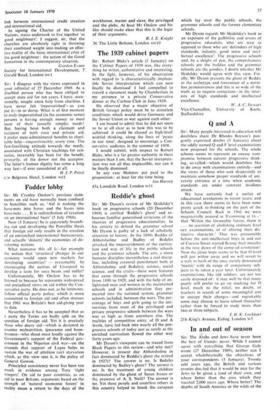Fodder lobby
Sir: Mr Cranley Onslow's previous state- ments on aid have normally been confined to banalities such as, 'Aid is making the have-nots into haves and the haves into have-nots . It is redistribution of taxation on an international basis' (5 July 1968).
Now (3 January) he is apparently branch- ing out and developing the Powellite thesis that foreign aid only results in the creation of an entrenched international bureaucracy, and actually 'distorts' the economies of de- veloping nations.
What nonsense this all is—for example the notion that 'structural changes in our economy would open new markets for developing countries! — presumably by encouraging the natives of Liverpool to develop a taste for soya beans and millet?
Unfortunately, Mr Onslow has to be listened to because he represents widespread and prejudiced views on aid within the Con- servative party. He does not, as he intimates, follow official party policy, which is more committed to foreign aid and often stresses that 1961 was Britain's best aid-giving year to date.
Nevertheless it has to be accepted that as a party the Tories are badly split on the question of foreign aid. Yet it is precisely those who decry aid—which is designed to counter malnutrition, ignorance and hope- lessness—who shout most loudly against the Government's support of the Federal gov- ernment in the Nigerian civil war—on the grounds that support of Lagos helps to sustain the war of attrition (sic) starvation which, as this view sees it, is the policy of General Gowon.
Principled consistency never has been too much in evidence among Tory 'right wingers'. On aid to poor countries, as on aid to poor Britons, arguments based on the strength of 'natural economic forces' in reality mean a return to the days of the
workhouse, master and slave, the privileged and the plebs. At least Mr Onslow and his like should make clear that this is the logic of their arguments.
R. I. E. Knight 36 The Little Boltons, London sw10


































 Previous page
Previous page